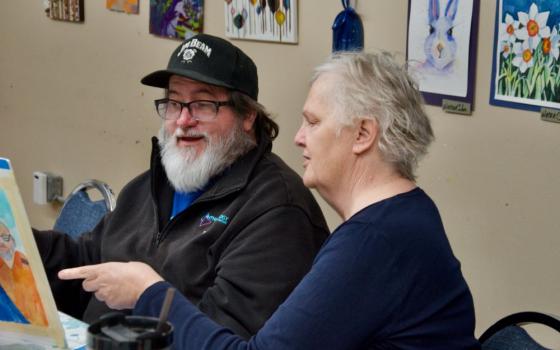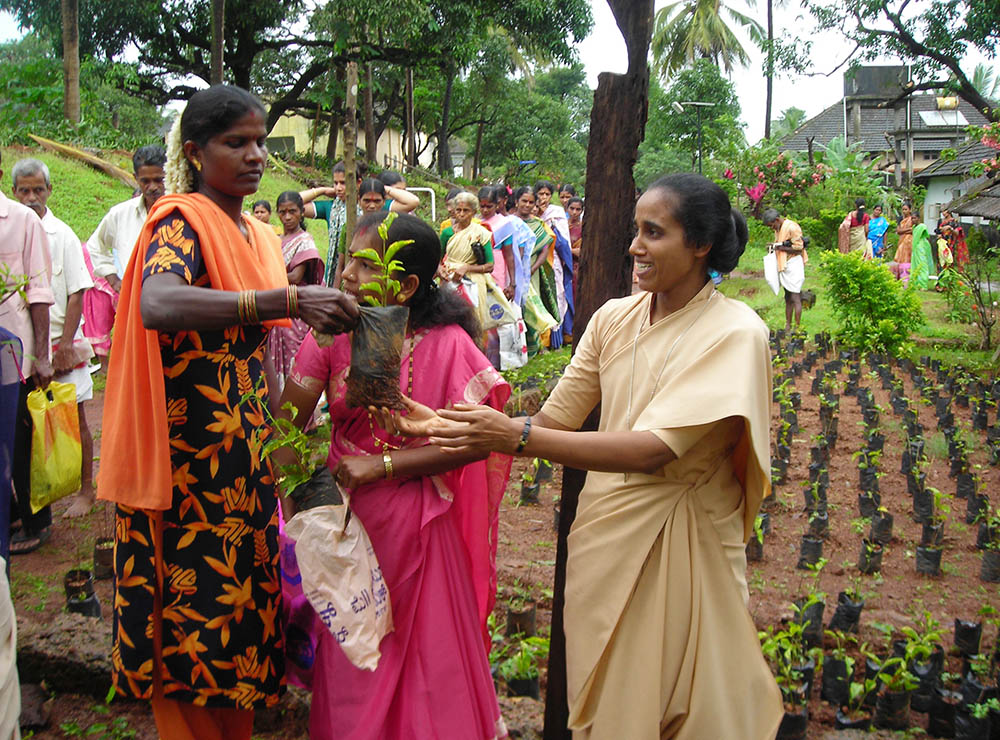
Helpers of Mount Rosary Sr. Anita Crasta distributes jasmine plants as part of promoting entrepreneurship among village women at her congregation's headquarters in Alangar near Moodabidri in the southwestern Indian state of Karnataka. (Courtesy of Celestine D'Souza)
Valerie Gastager, a German student, was excited to learn she could eat what she grew at the farm of a Catholic convent in southern India.
"We harvested and ate the vegetables we grew," Gastager said Feb. 28 as she showed Global Sisters Report the kitchen garden in the courtyard of the Helpers of Mount Rosary congregation at Alangar near Moodabidri, a town in the southwestern Indian state of Karnataka.
Valerie is among two male and two female students from German universities who have come to study tropical agriculture on an exchange program to learn under the Helpers of Mount Rosary, a diocesan congregation in the Mangalore Diocese.
As part of their nine-month training, which started in November, the Germans learn from the nuns how to cultivate grow vegetables and cash crops.
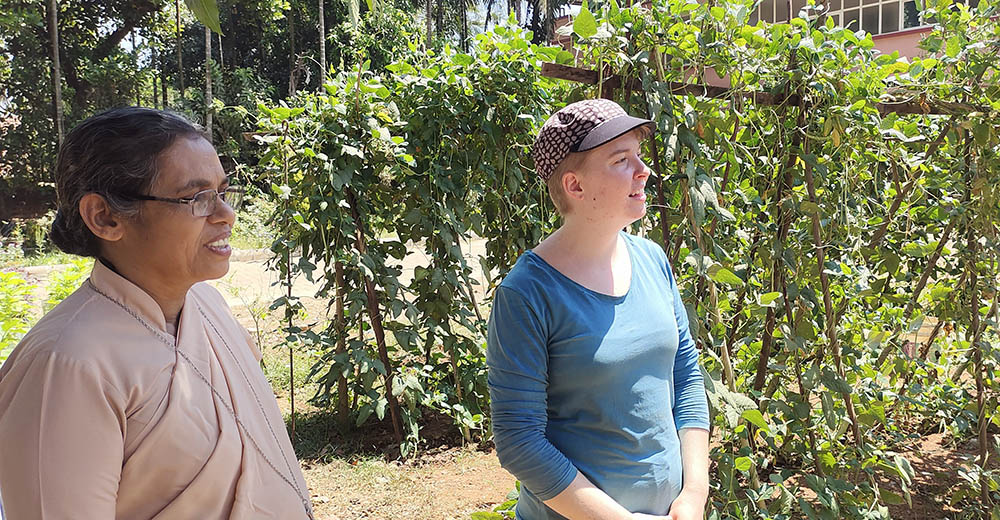
Sr. Theresia Mukkuzhy, a member of the Helpers of Mount Rosary, with Valerie Gastager, a German student who is part of an exchange program at Mount Rosary agricultural farms in Alangar near Moodabidri, a town in the southwestern Indian state of Karnataka (Thomas Scaria)
Sr. Theresia Mukkuzhy says teaching international students is the latest addition to the congregation's mission.
The congregation, founded in 1990 by Msgr. Edwin Pinto, a Mangalore diocesan priest, aims to serve the sociopastoral needs of the local people. Its mission is to promote organic farming and protect the environment, said Pinto, who lives in the congregation's headquarters in Alangar.
The priest, now in his early 90s, said the congregation serves farmers who are mostly poor. Most members of the congregation have come from farming families, he added.
The congregation has developed 40 acres of agricultural land in Alangar that now serves as a model farm and training field.
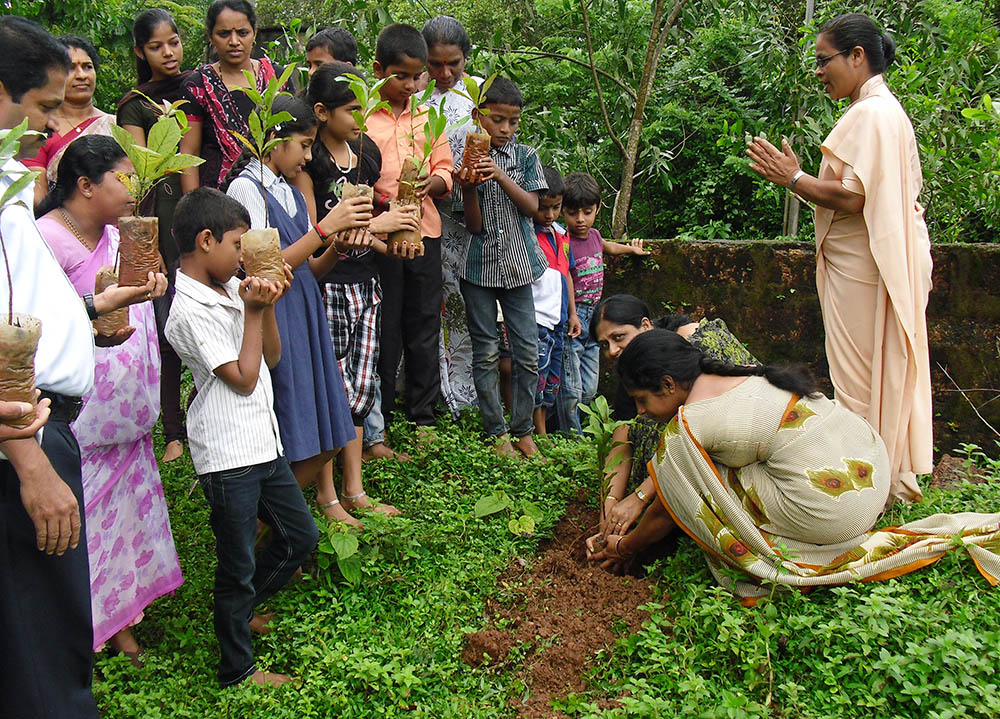
Sr. Felicita Pinto of the Helpers of Mount Rosary coordinates a seed-planting and sapling-distribution ceremony during the World Environment Day celebrations on June 5, 2022, at the congregation's headquarters in Alangar near Moodabidri, a town in the southwestern Indian state of Karnataka. (Courtesy of Celestine D'Souza)
"This land belongs to the diocese, but the plots for most other convents were donated by people," Pinto told GSR.
Mukkuzhy said FSL India, a placement agency that collaborates with the European Union, sent the German students. Ragland Devadass, director of field services at FSL India, said they chose the nuns' institutions because they are known as the "Farming Sisters."
"This is the fifth year of our contract with the sisters, and we regularly place foreign students with them," he told GSR, adding that the students are "really happy with the nuns."
Advertisement
Gastager said she and the other students got into the job by planting vegetables at the farms of the congregation's various convents. They watered and nurtured them and watched them grow. The students also visited neighboring villages to learn from traditional farmers.
Mukkuzhy, who celebrated her silver jubilee with the congregation in October, recalled learning scientific farming during her postulancy and novitiate. The nuns produce enough food for the congregation to live on.
"We even sell our produce in the market," said the 57-year-old nun, who is currently in charge of the congregation's agriculture ministry.
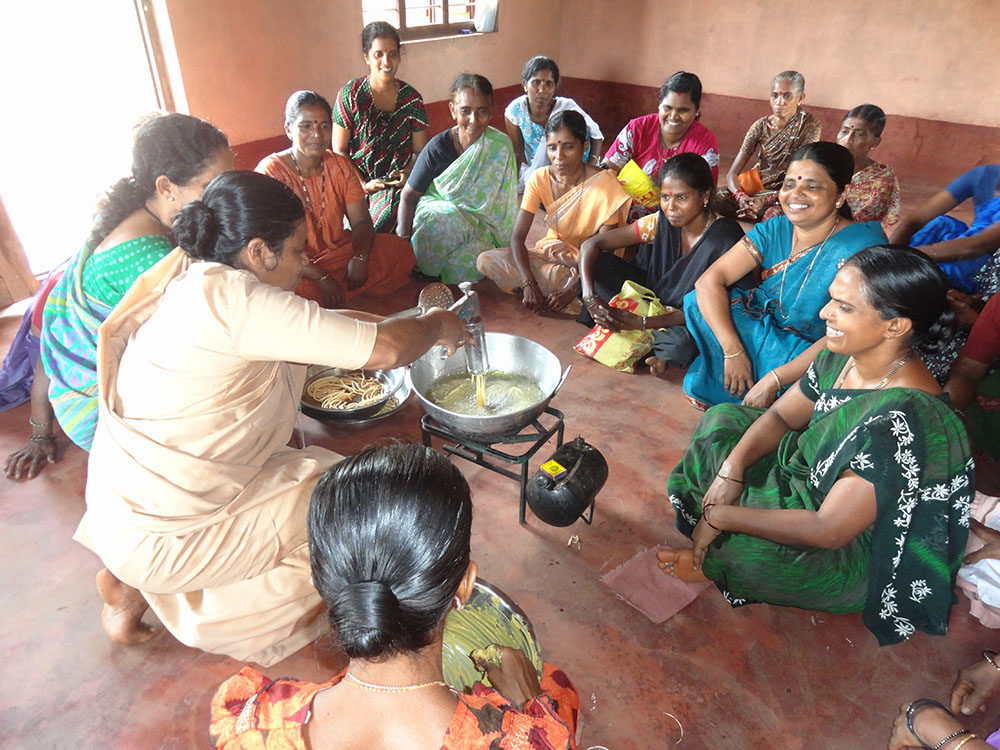
Helpers of Mount Rosary Sr. Roseline D'Souza demonstrates food preparation as part of promoting organic products for female entrepreneurs at a village center in the southwestern Indian state of Karnataka. (Courtesy of Celestine D'Souza)
The nuns use the farm on their convent land as a model to train villagers in modern organic farming, mostly through cash crops like coconuts, pepper, areca nuts, rubber, rice and vegetables. They also urge the villagers to grow kitchen gardens at their homes for personal consumption, Mukkuzhy said.
Each June 5, the nuns celebrate World Environment Day as a farmer's festival. They plant trees, distribute saplings to their neighbors, and organize voluntary farming, in which villagers provide free labor to the nuns to learn and practice scientific and organic farming, as it is the beginning of monsoon season. The sisters also teach the villagers watershed management during monsoons, as many villages experience water shortage in summer.
The nuns have formed self-help groups for women in the nearby villages, and as part of the program, the women volunteer to plant rice paddy in the convent farms. The nuns reciprocate by helping them with their home gardens.
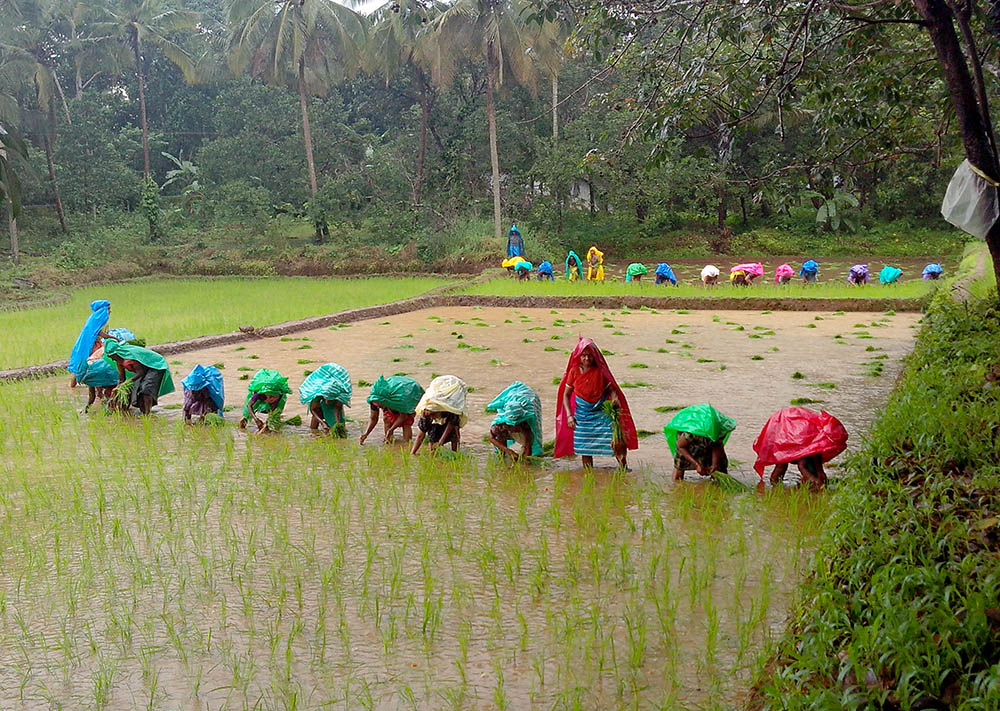
Sisters of the Helpers of Mount Rosary and female volunteers from villages engage in paddy cultivation during a monsoon at the congregation's formation house in Alangar near Moodabidri, a town in the southwestern Indian state of Karnataka. (Courtesy of Celestine D'Souza)
"It is a joy working with the sisters in their farms on paddy planting day and sometimes for harvesting," Leena Rodrigues, who lives near the Moodabidri convent, told GSR.
One of the sisters in Mukkuzhy's formation class, Sr. Irene Menezes, said they cultivate organic food because most vegetables and fruits available at the markets are "heavily contaminated with poisonous chemicals."
Pinto said he started the religious congregation to assist the diocese's pastoral and social apostolates. He said he wants the nuns' lives to merge with the agrarian community wherever they live, no matter the ministry to which they are assigned.
"Along with the spiritual formation, we have given them scientific training on organic farming," Pinto said.
In 2005, Pope John Paul II gave the congregation diocesan status. It now awaits pontifical status, said superior general Sr. Prescilla D'Mello. The congregation has more than 125 sisters serving in various parts of India as well as two houses in Austria and one in Italy.
At St. Joseph's Convent, the congregation's formation house in Alangar, and its farms, postulants and novices spend time farming and in prayer in preparation for their future mission, especially among villagers, said Sr. Celestine D'Souza, the formation superior.
The formation house sits on 4 acres of land where the congregation cultivates rice paddy, vegetables and crops such as coconuts, pepper, and areca nuts.
"For us, work is part of worship, and we experience fulfillment and God while working in the farms," D'Souza said, adding that their eco-spirituality helps them become attuned to nature and the environment.
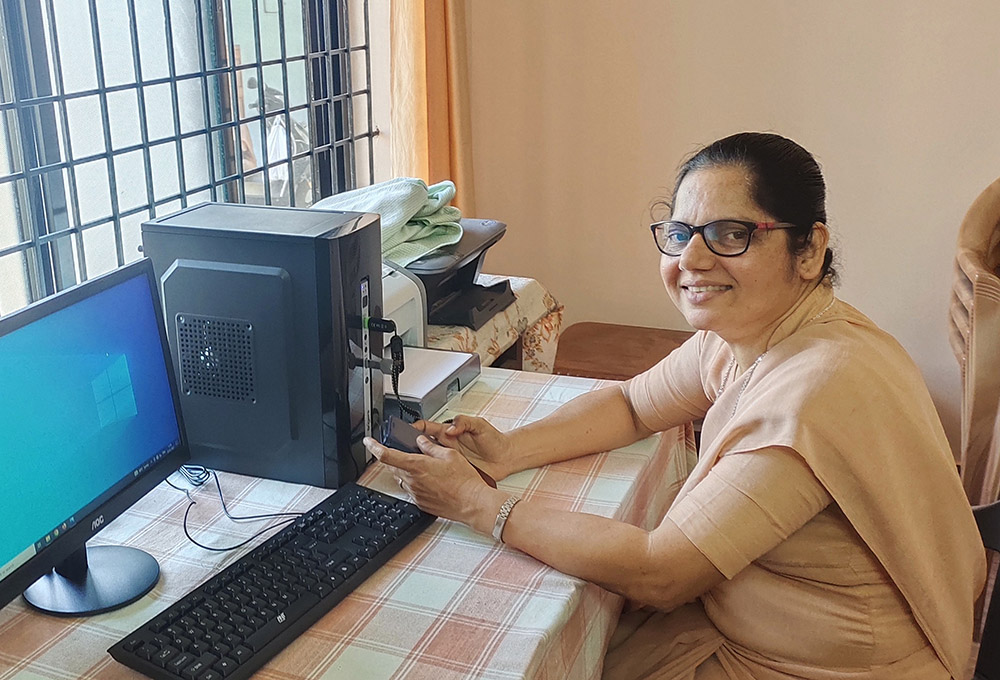
Sr. Celestine D'Souza, a member of the Helpers of Mount Rosary who is in charge of the congregation's postulants (Thomas Scaria)
D'Souza lamented how the global COVID-19 pandemic prevented people from coming together to farm and how untimely rains and drought because of unpredictable climate change have affected their work.
The sisters also learn cultivation patterns from other parts of India as new aspirants arrive, mostly from northeastern states, which have different types of soil and physical features.
"We are studying their pattern to train them, so that they can help their farmers once they go back as our members," she told GSR.
The nuns have won the diocese's admiration.
The Mount Rosary sisters "are like our own sisters from our own homes," said Fr. Faustine Lobo, a senior priest of the Mangalore Diocese and the spokesperson of the Catholic Church in Karnataka.
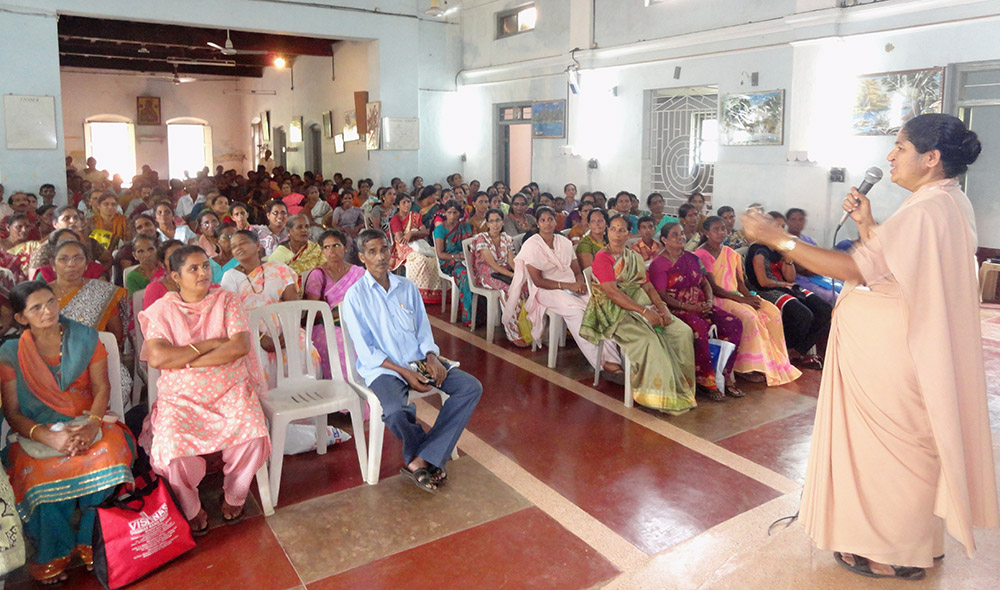
Sr. Prescilla D'Mello, superior general of the Helpers of Mount Rosary, addresses a group of farmers at the congregation's headquarters in Alangar near Moodabidri, a town in the southwestern Indian state of Karnataka. (Courtesy of Celestine D'Souza)
"They are humble and simple sisters who understand the pulse of the agrarian society," the priest told GSR.
Mukkuzhy said the hot tropical sun does not tire the German students.
"Even if they do, they have the determination and commitment to continue," she added.
Gastager said being with nature and its soil and plants automatically gives them divine energy. She said she has rediscovered her spirituality after being with the nuns.
"Though born a Catholic, I was not very regular to the church and spiritual services," she said. "But after working with the sisters in the farms, I have started attending Mass regularly."




